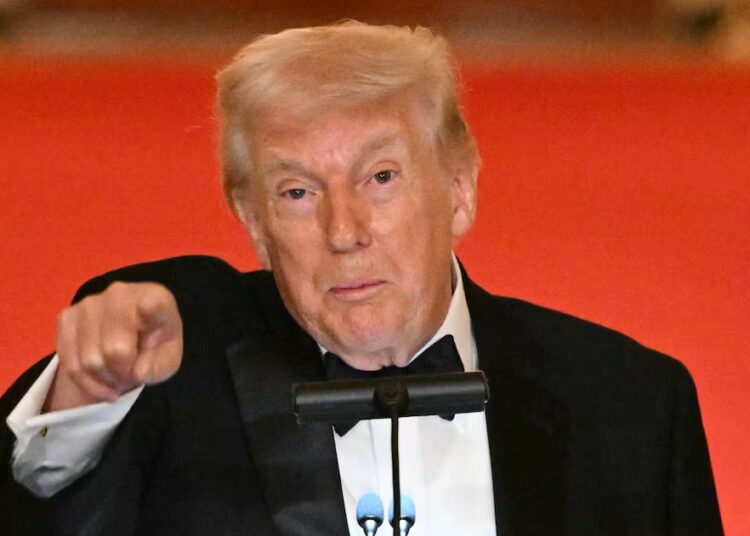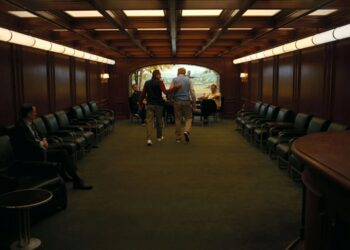
What would happen if a country — or some unknown party — launched a nuclear missile toward the United States?
Well, for starters, the decision-makers would have less than 20 minutes to decide. At best.
That’s the terrifying prospect portrayed in “A House of Dynamite,” the latest film from director Kathryn Bigelow, now streaming on Netflix. It follows in the tradition of her previous work that grapples with power and the way governments wield it, and takes audiences inside moments and places few of us ever get to see for ourselves. Her 2008 film “The Hurt Locker” follows a U.S. Army team that neutralizes explosive devices during the Iraq War and earned the best picture Oscar. Bigelow won for best director, making her the first woman to win in that category.
What would happen if a country — or some unknown party — launched a nuclear missile toward the United States?
Well, for starters, the decision-makers would have less than 20 minutes to decide. At best.
That’s the terrifying prospect portrayed in “A House of Dynamite,” the latest film from director Kathryn Bigelow, now streaming on Netflix. It follows in the tradition of her previous work that grapples with power and the way governments wield it, and takes audiences inside moments and places few of us ever get to see for ourselves. Her 2008 film “The Hurt Locker” follows a U.S. Army team that neutralizes explosive devices during the Iraq War and earned the best picture Oscar. Bigelow won for best director, making her the first woman to win in that category.
With “A House of Dynamite,” she sought to create a similarly realistic viewing experience. This isn’t her first film about the subject matter; 2002’s “K-19: The Widowmaker” was based on the Soviet Union’s first nuclear ballistic missile submarine. But “A House of Dynamite” is more hypothetical. Noah Oppenheim, a screenwriter and former NBC News president, wrote the screenplay, which depicts the U.S. government being stress-tested in the most high-stakes way possible.
Since the film’s release last month, the U.S. and Russia have signaled a desire and openness to restart nuclear testing for the first time in decades — a previously unthinkable development. I asked Bigelow and Oppheneim about that, the Pentagon’s pushback to their film and more during a recording of The Washington Post’s “Post Reports” podcast, which you can listen to here or watch here. We spoke as the federal government shutdown had just surpassed the record for the longest ever. Below are excerpts from that conversation.
Where did the idea for this film come from for you?
Kathryn Bigelow: It was just a kind of, what would happen if a nuclear ICBM [intercontinental ballistic missile] was headed toward North America, and then what would happen in the halls of power, what happens in the command and control protocol? And I was curious about what would go on, and how. Where’s the chain of command, how does it go up to the president? And a friend of mine, a colleague of mine said, “Well, there’s a screenwriter you should talk to who’s basically a subject-matter expert. His name is Noah Oppenheim.”
So, why was that a topic on your mind to begin with? Because I don’t think that’s something that most of us sit around and think about.
Bigelow: I’ve always been fascinated with national security and the whole sort of nuclear catastrophic potential was always sort of top of mind. And also I come from the era of duck and cover. When I was very little, we had to hide under the desk in the event of an atomic bomb blast. So I’ve always thought about it, and then recently having done these pieces in national security — “The Hurt Locker,” “Zero Dark Thirty” — I naturally gravitated to this subject.
Noah, when you were presented with this notion of working with this acclaimed director on this topic and this story that she was really interested in, what was your entry point into it? Was this something that was also on your mind? And when Kathryn says you were a subject-matter expert, what is she speaking to there?
Noah Oppenheim: I would have pretended to be a subject-matter expert on almost anything for the opportunity to work with her, as you point out. It’s sort of the kind of phone call and introduction you dream about if you’re a screenwriter. It’s an issue I shared a passion for; I’d covered it as a journalist. I had been running NBC News when North Korea was sort of revealed to be a nuclear power. And I’d also long been passionate about the genre of films about nuclear war, whether it’s “Dr. Strangelove” or “Fail Safe” or even more kind of commercial pop fare like “War Games.” I just had always been deeply interested in the subject.
One thing, Kathryn, you alluded to is this sense of almost normalization. You mentioned you grew up in the era of duck and cover, where this threat was very front and present. But it seems like now we’re in an era, or at least in the past few years we’ve been in an era, where this is just the hum in the background that no one is paying attention to.
Bigelow: If it’s even a hum. I mean, it really has been normalized. It’s sort of the elephant in the room, and nobody talks about it anymore. And I thought, well, this might be interesting to kind of begin to dig beneath the surface of it. And, and lo and behold, you know …
There was a lot of material there.
Bigelow: And it’s terrifying. To have 12,000 nuclear warheads, if the count is accurate, nine nuclear countries, only three are members of NATO. I mean, that’s a calculus that I think is kind of heart-stopping.
Why do you think that normalization has happened? Is part of it that to grapple with that reality every day is almost too much to bear?
Bigelow: I think that’s a very good point. I think it could be. It’s unfathomable to me that we’re not in a process of denuclearizing the world. And obviously it has to be a global embrace of that concept and effort, but it just doesn’t seem to be.
Oppenheim: I think there was a perception with the end of the Cold War that somehow the threat had diminished. And in reality, we all know now that the world has only grown more complicated, volatile and risky. And now we’ve seen in a weird way in the last couple of weeks even, it’s sort of being pushed back front and center.
You’ve spoken in other interviews about this inflection point between film and journalism … and it strikes me that “A House of Dynamite” is, in some ways, a much more theoretical and speculative film than your other films. How do you view this film within your body of work when you are thinking about, “I am depicting reality for audiences”?
Bigelow: I think that’s a good question. I think, yes, it’s hypothetical. I mean, it hasn’t happened yet. But nonetheless, its degree of accuracy and authenticity and credibility is extremely heightened, and I would say on a par with those other movies.
Oppenheim: I think both Kathryn and I share a journalistic approach to filmmaking in the sense that when we were building this story, we began by first speaking to people who’d had these jobs, been in these rooms, people who had served at the highest levels, the White House, the Pentagon, the CIA. And we just would ask them questions as if you were reporting out a news story. How would this unfold if a missile were headed our way? What steps would these various institutions within our government take. And then we’d get to the end of the conversation and like a reporter, you’d say, “Well, who else should we talk to? Who else could shed some more light on this?”
And so we built it from the ground up through a series of facts gathered from experts and people who’d held these jobs. And the other thing that I would say is sort of journalistic about the approach is Kathryn’s commitment these last couple decades to confront with her films real-world issues. And with this, it’s an issue that is front and center in the headlines, as we see. And she’s using her extraordinary storytelling powers to shed light on that and drive a conversation around it.
Bigelow: Well, I think film can be actually both entertaining and informational. So there is an inflection point in the two.
Noah, just to speak about the structure of the film: We’re sitting with characters who intersect with one another throughout, but we’re sitting with the same 20, 30 minutes played out from different perspectives. Was that format always baked in for you, and why was that formatting compelling to you?
Oppenheim: From the very beginning, Kathryn and I both felt it was important to tell the story in real time. And by the story, I mean the 18 minutes it would take from the launch of a missile in the Pacific theater somewhere to impact in the continental United States. Because when we began our research process, one of the things that we found most terrifying was how quickly this would unfold. That it would be less than 30 minutes from that side of the world. If a Russian sub were to ever launch off our Atlantic coast, it could be 10 to 12 minutes. So you’re talking about such a tight period of time for our government’s decision-makers to respond. And we wanted to convey that to the audience, not abstractly, but in a very visceral way. So they understand when those 18 minutes are over, how quick that just was. And then obviously, 18 minutes is not the length of a feature film. So we wanted provide multiple perspectives and hopefully increase the audience’s understanding with each retelling. You start on the ground floor with the first responders, if you will, the young soldiers at Fort Greely who operate our missile defense system, the watch officers in the White House. These people are the first to react, respond, convene the figures and authorities. They have no power over what’s going to then unfold. The next telling is the commander of Stratcom [U.S. Strategic Command], the deputy national security adviser. These folks have a little bit more influence and they’re invited to give advice. And then the last telling is in some ways, the most important telling, which is the president of the United States, who in our country is a nuclear monarch and has sole authority to make this decision.
Can you speak a little bit more about how you both ensured the accuracy of this film? Because really, what you’re doing is, you are taking viewers into rooms that none of us really get to go in, except for a handful of people.
Bigelow: Well, we were able to see these environments, speak to the people that work there, actually encourage some of those people to become our tech advisers and work with us on the set every single day we were shooting.
Who are some examples?
Bigelow: Like [retired generals] Dan Karbler, Doug Lute and there were other people as well. So they were there on the set every single day or with me at the monitor, too. So it was a very carefully monitored shoot for accuracy. We were invited to the battle deck at Stratcom, to the White House Situation Room, we were able to spend a little bit of time in there. And so my production designer and I would go in and just replicate it to within an inch of its life.
So you were able to visit these places?
Bigelow: Oh, yes.
Was that during the previous administration?
Bigelow: Yes, during the Biden administration.
Since the release of this film there have been news stories about the accuracy or about the pushback to it. Bloomberg News reported that the Pentagon’s Missile Defense Agency had released an internal memo which told recipients to prepare to “address false assumptions, provide correct facts and a better understanding” about the weapons depicted in the movie. How do you respond to that? [A Pentagon spokesperson told The Post in a statement they were “not consulted in the production of this film, and it does not reflect the views or priorities of this administration.”]
Oppenheim: It’s not really a debate between us as filmmakers and the Pentagon. It’s a debate between the Pentagon and the wider community of experts. The specific thing that they’re pushing back on is the efficacy of our missile defense system. And we spoke to a ton of people who work in that field, who study that. And frankly, the testing statistics are publicly available and it is unfortunately the case that those tests have demonstrated a roughly 60 percent accuracy.
I think you all gave them a better accuracy, right?
Oppenheim: Some people told us it was more like 55 or lower. And of course, those are carefully scripted tests where they know exactly when the missile’s going to come, where, and they can control the conditions. Now, that being said, this is not for lack of trying. The people who work in missile defense, including some of our consultants, are really good at their jobs, working really hard to solve this problem. But, you know, one of the questions that we wanted to open a debate around, and which the Pentagon has now engaged in, is: Is it possible to build an impenetrable shield? Is that really the way to keep us safe, or are there other levers we should be pulling like nonproliferation and denuclearizing?
Bigelow: Reducing the nuclear stockpile.
In some ways, this film felt like one about the U.S. government being stress-tested in the most high-stakes way possible, and it’s also coming out at a time when our government institutions are being stress-tested in previously unthinkable ways. We’re talking while the government is still shut down, and the federal workers overseeing the U.S. nuclear stockpile are on furlough. Obviously, neither of you knew that would be happening when your film came out, but given the current moment that we’re in, how are you processing this film in a different way now than you were when you were thinking about it and making it?
Bigelow: I don’t think necessarily different. When we talked about it, from the very beginning, we talked about it as a warning. This is something that could be very important to know about. And again, trying to move the needle toward reducing the nuclear stockpile. And so I don’t think that agenda has shifted at all. If not, it’s perhaps become more important.
Oppenheim: One of the things I think we hope the movie does is show the extraordinary work that these public servants do. The folks who work in the White House Situation Room, at Stratcom, at FEMA [Federal Emergency Management Agency], inside all these government agencies, they are doing their best every day, for the most part, to keep us all safe, and they’re doing incredibly important work. And I think that we both wanted to honor that with their portrayal in the film. And obviously anything that kind of stresses them even further is something we should all take seriously.
Going back to where we began this conversation, about this hum in the background, the normalization — what strikes me by what you described, Noah, and what we see in the film is that in some ways I’m watching the fictional president say, “I only got one briefing on this.” And I’m thinking, oh, wait, is there also a normalization among the people who are responsible for these decisions?
Bigelow: I mean, it certainly looks that way, perhaps. It just doesn’t feel like it’s top of mind. I think it was. But there are whole generations that don’t understand that there are nuclear weapons out there and nine nuclear countries and only three are members of NATO. And that’s a very, very terrifying calculus, in my opinion.
Oppenheim: And that lack of preparation was something that came up in our research process. Very senior former government officials who Kathryn asked, “How often does the president rehearse for this?” And he said, “Pretty much never.”
To bring it back to this moment: President Donald Trump recently announced that he was going to order nuclear testing to resume on equal footing with China and Russia. And then Russia came out and said they’re going to begin looking at nuclear testing. How did you receive that news when you heard it?
Bigelow: Well, it’s shocking, surprising.
In some ways it makes the film feel a little even more urgent, like this idea that we were living in a hum and normalization, but this is coming back up again.
Oppenheim: One of the dangers of normalization is that there used to be a taboo around speaking about the use of these weapons. Even the mere mention or consideration or contemplation of their use used to be off limits, because it was deemed to be escalatory. I think both of us would like to see the world get back to a place where the use of these weapons would be so unthinkable that it’s not even theorized about.
What is the next conversation, the next question that you hope people will have after engaging with this film?
Oppenheim: How do we make the world safer?
Bigelow: We live, it seems like, in a house of dynamite. And not just, how can we get the dynamite out of the walls, but it’s a very combustible environment. Do we want to live in that space? A movie is basically a question posed to an audience. And the audience has the ability to make an answer. It’s provocative, but it’s hopefully thought-provoking.
The post What scared Kathryn Bigelow into making ‘A House of Dynamite’
appeared first on Washington Post.




